
According to published statistics, the number of foreign tourists who came to Spain in June decreased by 98% compared to the same month last year. On the other hand, the number of foreign tourists in Spain during the first six months of this year was 72% less than in the first half of last year.
Create: Aug 4, 2020 Edit: Aug 13, 2020 International News
The outbreak of the coronavirus has reduced the number of tourists visiting Italy to 6 million, especially from countries such as China and the United States in July. On the other hand, 4 million Italian citizens have canceled their trips due to fears of corona and economic problems. This has a devastating effect on the economy and employment of the tourism sector, with 2.7 million employees working in 612,000 companies and institutions.
Create: Jun 30, 2020 Edit: Jul 4, 2020 International News
According to the Japan National Tourism Organization, the number of foreign tourists in Japan has dropped sharply in the first three months of this year. This is the lowest figure since the 2011 bacause if tsunami. The number of tourists from China and South Korea to Japan has dropped by 88 and 80 percent, respectively. Japan's International tourists decline upto 93 percent in March comparing last year.
Create: May 7, 2020 Edit: May 9, 2020 International News
France 24 TV report; Economic activity in Greece has declined by 70 percent in recent weeks and is at risk of an economic crisis. Tourism is the second largest source of income for Greece after commercial shipping. The Greek islands are empty of tourists, and one in four hotels is on the verge of bankruptcy.
Create: May 5, 2020 Edit: May 6, 2020 International News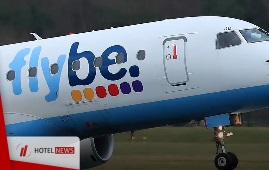
Flybe Airlines has declared bankruptcy due to a sharp decline in passengers following the Corona outbreak. The company has told its customers that all its flights have cancelled and all its business in the UK has been halted.
Create: Mar 7, 2020 Edit: Mar 7, 2020 International News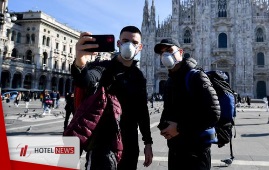
At present, clear indications of the impact of the outbreak on German tourism is obvious which include short queues at airport gates and preventive measures for Asian travelers wearing face masks. Travel restrictions in Europe can also affect Black Forest tourism. TUI, Germany's largest travel company, has also announced a reduction in Asian tours. According to the German Travel Association, the desire to book hotels and tickets has declined dramatically.
Create: Mar 6, 2020 Edit: Mar 6, 2020 International News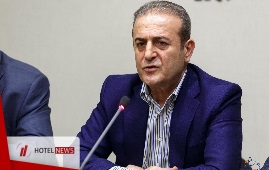
Disaster in hotels of the capital. Hotel Occupancy Rate decreased to zero. Mohammad Ali Farrokhmehr, the head of Tehran Hoteliers Association announced; The hotel business has declined to 98 percent and almost all hotels and apartments are closed. This year we have had a 40% reduction in occupancy rate despite all discounts, but this has fallen to zero since last week, as the corona virus outbreak in the country. Despite the problems, the employers have paid their salaries in full for March and we hope to return to normal by April.
Create: Mar 2, 2020 Edit: Mar 2, 2020 Regional News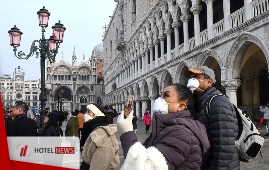
Due to Corona virus outbreak, Italy's economy, including the tourism industry, has been influenced by the spread of the Corona virus, and the governor of Veneto ordered the opening of all schools, cinemas, museums and public places on Monday. In Italy, more than 400 people have been infected with the coronavirus. Many sports competitions were postponed following the outbreak. Many foreign tourists canceled their planned trips to its cities, including the historic city of Venice.
Create: Mar 1, 2020 Edit: Mar 1, 2020 International News
Frontline Employee Training Technique 16 Ingrain the Ten Feet Rule; During new employee orientation, it must be emphasized to all new employees that they must greet guests whenever they pass within 10 feet of them. It is never acceptable to not greet a guest. If the guest is on his/her mobile phone then a smile, a nod, and a wave can serve as the greeting. Technique 17 Help Employees to Remember Guest Names; During new employee orientation, everyone should be provided with some tactics regarding how to remember repeat guests’ names. Technique 18 Offer Body Language Training; During new employee orientation, all new frontline asso- ciates should be provided training regarding how to manage their body language cues when interacting with guests. Such cues include items such as smiling, eye contact, hands in pockets, etc. Technique 19 Incorporate Surprise Stories in Shift Huddles; In every daily shift huddle, one associate should be ran- domly selected to tell the group how s/he positively surprised a guest in the past 48 hours. Technique 20 Incorporate Encounter Stories in Shift Huddles; What guest did you meet today? In every daily shift hud- dle, one associate should be randomly selected to name a guest s/he met and tell the group something about the guest such as where they are from, their family, etc. This practice in the huddle will encourage the staff to talk to the guests. Technique 21 Conduct a Core Value Rotation in Shift Huddles; Every hotel should have between 8–10 core values that define the organizational culture. At the end of each daily shift huddle, one of the core values should be discussed so that each one is covered in an 8–10 day rotation. Technique 22 Conduct a Core Value Rotation in Shift Huddles; Every hotel should have between 8–10 core values that define the organizational culture. At the end of each daily shift huddle, one of the core values should be discussed so that each one is covered in an 8–10 day rotation. Technique 23 Use Foreign Language Greetings When Appropriate; In hotel properties with an international clientele, the front desk agents should know greetings in various languages and use them when appropriate. Technique 24 Ingrain the Drama Metaphor; All associates should be taught that they are on-stage whenever a guest can see or hear him/her. Such on-stage behavior applies to associates regardless of whether or not they are clocked-in for work. In other words, a guest perceives a uniformed employee as a representative of the hotel whether the employee has begun his/her shift or not. Technique 25 Train the ‘Again’ Effect; If an associate recognizes a guest as being a repeat patron, but cannot recall his/her name, the associate should be trained to say ‘nice to see you again.’ Inserting the word ‘again’ helps strengthen the relationship between the guest and service provider. Technique 26 Express Gratitude to Guests; A guest must feel appreciated and cannot be thanked too much. Associates should be trained to thank them for their business throughout their stay: “Thank you for staying with us”, “Thank you for dining with us”, etc. Technique 27 Teach Proper Response to ‘Thank You’; All associates should be trained to reply with ‘thank you’ when a guest says ‘thank you’. Intense competition in the hotel sector mandates that guests feel appreciated for their business. Replies to ‘thank you’ such as ‘no problem’ do not communi- cate appreciation or leave a lasting impression. Technique 28 Set the Tone During the Reservation Process; When a guest makes a reservation via the hotel, it creates a great opportunity to get them excited about coming to the hotel. The tone of the reservationist’s voice is very important and has the opportunity to start the exceptional guest service before they even arrive at the hotel. Reservationists should be trained to speak with enthusiasm, so the guest will feel it too. This enthusiasm sets the tone for their stay. Technique 29 Smile While on the Telephone; A mirror should be hung in front of all hotel reserva- tionists and they should be trained to check their smiles in the mirror when conversing with potential guests. Smiling changes voice tone and inflection. Technique 30 Do Not Unnecessarily Disclose Overbooking; Reservationists should be trained never to tell guests that they are overbooked on a requested night. Simply stating that the hotel is full would suffice in the conversation. Overbook- ing is viewed by many consumers as an unethical and greedy practice. Technique 31 Use Hospitable Responses to ‘How are you?’; If an associate is asked by a guest ‘how are you?’ the asso- ciate should not respond that s/he is happy because s/he is ‘off tomorrow.’ Expressing happiness because of an upcoming separation from guests does not communicate a hospitable culture. Technique 32 Tell Jokes and Riddles to Children When Appropriate; All frontline associates should be instructed to learn at least one children’s riddle that can be told when children move through their areas accompanied by their parents. A basic Internet search reveals numerous websites listing children’s jokes and riddles. Technique 33 Use Strong Telephone Greetings; An associate’s name is important to a guest. All associates should be trained to state their names when they answer the telephones in their departments. Technique 34 Make Guests the First Priority; Who’s more important, the manager or the guest? The entire management team should understand that when an employee is engaged with a guest, the guest is most important. Likewise, some employees think that “Oh there is a manager, I better acknowledge him/her.” Both management and staff should be taught to focus on the guest first. Technique 35 Check Websites for Accuracy; During off-peak times, front desk associates should be trained to routinely check websites that describe the hotel for accuracy. Are the hours of operations correct for the various departments? Are the hotel’s features and amenities listed correctly? Technique 36 Learn the Language of Guest Segments Do you know who your guests are? If you are near a uni- versity, medical center, or in a leisure market—bring in “spe- cialists” to talk and train the hotel staff on what to say, ask and explain. These specialists normally will do it free of charge. The more knowledge your staff has, the easier it is to provide a more personalized style of service. Technique 37 Eliminate Hairs; All housekeepers should be trained that the most com- mon cleanliness problem in the guestroom experience is hair in the bathroom (on floor, tub, or vanity). Technique 38 Offer Luggage Assistance; All hotel staff should be trained to spot guests carrying bags and to tell the guests that they would like to help carry the items for them. If the guests decline, the service offered signals care and attention to detail. To be continue...
Create: Feb 1, 2020 Edit: Mar 31, 2020 Hotel Management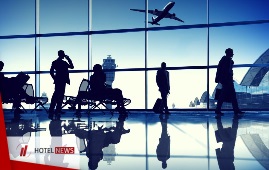
A 4% increase on the previous year which is also forecast for 2020, confirming tourism as a leading and resilient economic sector, especially in view of current uncertainties. By the same token, this calls for such growth to be managed responsibly so as to best seize the opportunities tourism can generate for communities around the world. According to the first comprehensive report on global tourism numbers and trends of the new decade, the latest UNWTO World Tourism Barometer, this represents the tenth consecutive year of growth. All regions saw a rise in international arrivals in 2019. However, uncertainty surrounding Brexit, the collapse of Thomas Cook, geopolitical and social tensions and the global economic slowdown all contributed to a slower growth in 2019, when compared to the exceptional rates of 2017 and 2018. This slowdown affected mainly advanced economies and particularly Europe and Asia and the Pacific. Looking ahead, growth of 3% to 4% is predicted for 2020, an outlook reflected in the latest UNWTO Confidence Index which shows a cautious optimism: 47% of participants believe tourism will perform better and 43% at the same level of 2019. Major sporting events, including the Tokyo Olympics, and cultural events such as Expo 2020 Dubai are expected to have a positive impact on the sector. Responsible growth Presenting the results, UNWTO Secretary-General Zurab Pololikashvili stressed that “in these times of uncertainty and volatility, tourism remains a reliable economic sector”. Against the backdrop of recently downgraded global economic perspectives, international trade tensions, social unrest and geopolitical uncertainty, “our sector keeps outpacing the world economy and calling upon us to not only grow but to grow better”, he added. Given tourism’s position as a top export sector and creator of employment, UNWTO advocates the need for responsible growth. Tourism has, therefore, a place at the heart of global development policies, and the opportunity to gain further political recognition and make a real impact as the Decade of Action gets underway, leaving just ten years to fulfill the 2030 Agenda and its 17 Sustainable Development Goals. The Middle East leads The Middle East has emerged as the fastest-growing region for international tourism arrivals in 2019, growing at almost double the global average (+8%). Growth in Asia and the Pacific slowed down but still showed above-average growth, with international arrivals up 5%. Europe where growth was also slower than in previous years (+4%) continues to lead in terms of international arrivals numbers, welcoming 743 million international tourists last year (51% of the global market). The Americas (+2%) showed a mixed picture as many island destinations in the Caribbean consolidated their recovery after the 2017 hurricanes while arrivals fell in South America due partly to ongoing social and political turmoil. Limited data available for Africa (+4%) points to continued strong results in North Africa (+9%) while arrivals in Sub-Saharan Africa grew slower in 2019 (+1.5%). Tourism spending still strong Against a backdrop of global economic slowdown, tourism spending continued to grow, most notably among the world’s top ten spenders. France reported the strongest increase in international tourism expenditure among the world’s top ten outbound markets (+11%), while the United States (+6%) led growth in absolute terms, aided by a strong dollar. However, some large emerging markets such as Brazil and Saudi Arabia reported declines in tourism spending. China, the world’s top source market saw outbound trips increase by 14% in the first half of 2019, though expenditure fell 4%. Tourism delivering ‘much-needed opportunities’ “The number of destinations earning US$1 billion or more from international tourism has almost doubled since 1998,” adds Mr Pololikashvili. “The challenge we face is to make sure the benefits are shared as widely as possible and that nobody is left behind. In 2020, UNWTO celebrates the Year of Tourism and Rural Development, and we hope to see our sector lead positive change in rural communities, creating jobs and opportunities, driving economic growth and preserving culture.” This latest evidence of the strength and resilience of the tourism sector comes as the UN celebrates its 75th anniversary. During 2020, through the UN75 initiative the UN is carrying out the largest, most inclusive conversation on the role of global cooperation in building a better future for all, with tourism to be high on the agenda.
Create: Jan 26, 2020 Edit: Jan 26, 2020 International News
UK hoteliers face a tough year in 2020 with a growth in rooms supply increasing competition and dampening revenues, despite underlying demand remaining strong. ‘Hotels in the UK provinces found 2019 challenging and there seems to be little opportunity to improve this performance in 2020,’ commented HVS London chairman Russell Kett. ‘The pipeline of new hotel openings will continue to add further pressure to many hotels which have experienced a decline in occupancy and average rates, sometimes both. Once the current pipeline has worked its way through and post-Brexit demand levels have picked up, positive growth should be seen as we move into 2021 and 2022,’ he added. Demand for hotel rooms in London remained at a strong level throughout 2019 and hotels are likely to see a continuation of this, notwithstanding the growth in supply, especially at the luxury end of the market, which may lead to a softening of hotel occupancy levels. ‘Average rates in London should continue to grow, however, so overall RevPAR [rooms revenue per available room] is likely to remain flat throughout the year,’ added Kett. HVS has identified five key themes likely to impact the sector moving forward into the new decade – the need for a personalised offer; the importance of developing a relationship with the guest; the issue of corporate responsibility; attracting and retaining good staff; and the need to maximise profitability. Whether a hotel will get a particular guest’s business now depends on whether it will provide an appropriate experience beyond the minimum expectation of a comfortable bed, decent shower, fast efficient Wi-Fi and good value for money,’ said Kett. ‘Gen X and Gen Y travellers seek a more personal offer – an experience to remember that they can’t get elsewhere.’ Furthermore, hotels and hotel companies can no longer rely on loyalty schemes to build a relationship with guests as many no longer care about incentives such as free stays, especially when they are restricted from redeeming them. Hoteliers need to find a way to develop a meaningful relationship with customers to enhance their loyalty. HVS’s third concern is that of sustainability and social responsibility, which is increasingly forming part of consumers’ – and investors’ – decisions. It’s now essential for hotel operators to have such policies and to communicate them effectively to the guest – paying lip service isn’t enough. Credible environmental policies are now an essential part of business life. Likewise, the ongoing importance of attracting and retaining staff through competitive packages, providing training and meaningful career development has never been more vital in the sector, particularly post Brexit. Making staff feel part of a ‘family’, providing a flexible working environment and profit-sharing are already starting to make a huge impact in some businesses and more needs to be done to make the sector more attractive to potential recruits who live in the UK as well as ensuring current vacancies can be filled. Lastly, hoteliers need to ensure that as many areas of their hotel as possible are income producing in order to deliver a proper return on investment. A minimum of 15%, but preferably 20% profitability should be sought from F&B operations, for example, with under-performing areas of a hotel developed to provide overnight guests and non-residents with a well-designed range of refreshment options that make money. Concluded Kett: ‘The world is changing fast and hoteliers need to adapt and incorporate these changes in a creative way in order to survive and prosper.’
Create: Jan 13, 2020 Edit: Jan 13, 2020 International News
Two consecutive months of profit growth gave way to a contraction in November for hotels in the Middle East & North Africa as GOPPAR declined year-over-year. The region had a nice, albeit short, run of GOPPAR gains prior to November’s downtick, but the drop is more in line with MENA’s overall dim 2019 performance. If there is a silver lining, the 1.7% drop is the smallest YOY decrease of the year and far smaller than the YTD number of -4.2%. Rooms revenue was down 2.6% compared to the same month last year, dragged down by a 5.1% drop in room rate. Occupancy for the month was up 1.9 percentage points to 76.2%. The drop in rooms RevPAR, along with a 1.5% YOY decrease in F&B RevPAR, equated into an overall decrease in total revenue of 2.7% YOY. And while generating revenue in November proved onerous, expense control was a bright spot. Total overhead costs on a per-available-room basis were down 3.4% YOY and total labour costs were also down—2.4% YOY. Utility expenses came down 3.0%, while overall Property & Maintenance costs were down 2.6%. In contrast to the totality of MENA, Egypt pushed out a positive month of profit, with a 2.9% overall YOY jump. This came on the back of a 1.3% rise in RevPAR and a 3.6% rise in TRevPAR. The resort town of Sharm el-Sheikh saw a huge GOPPAR leap of 65.1% YOY, bolstered by a 28.6% jump in RevPAR. The fortunes of Sharm el-Sheikh hotels have turned for the better after having dealt with its share of terrorist attacks, including in 2005 and, in 2015, when a Russian jetliner departed the city and subsequently exploded over Sinai killing 224 people onboard. Thereafter, the UK grounded flights to the beach getaway, and weekly arrivals fell from 10,000 to zero. In December, flights resumed from the UK, which should put a further jolt into the resort town’s tourism economy. Meanwhile, Egypt’s capital, Cairo, did not share the same fortune, checking in with a 1.5% decrease in GOPPAR YOY. RevPAR was down 3.4% YOY, a result of both a drop in rate (down 1.9%) and occupancy (down 1.2 percentage points). TRevPAR for the month was up 0.8% due to a 9.2% YOY increase in F&B RevPAR. It was another down month for Dubai, which saw its profit drop 9.6% YOY. The emirate has only had one month of YOY GOPPAR growth in the last 15, plagued by excessive and unabated hotel supply and development. Coming months and years will require hoteliers to be more cost-conscious than revenue-conscious, according to many experts. RevPAR in Dubai was down 9.3% YOY in November, as room rate dropped 8.6% YOY combined with a -0.7% percentage-point decline in occupancy. Total overhead costs declined in the month, down 6.2% YOY, but not enough to produce positive profit growth, evidenced by a 0.4 percentage-point decline in profit margin.
Create: Dec 30, 2019 Edit: Dec 30, 2019 International News
